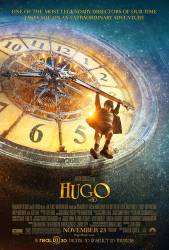Continuity mistake: Lighting on the automaton changes between shots when Hugo uncovers it for the first time, notice the structure underneath: from hidden to visible.
Continuity mistake: Hugo tucks the beret covering his eyebrows, but a frame later it's above them.
Continuity mistake: When Uncle Claude shows up to deliver the bad news, Hugo turns around twice.
Continuity mistake: When Frick greets the lady for the first time, a waiter suddenly appears next to her in the second angle.
Continuity mistake: When Hugo leaves the notebook on the counter, it swaps from laying straight to skewed between shots.
Continuity mistake: At the toy-shop, Hugo empties his pocket and Méliès places his hand over the cloth and then takes it back. From the opposite angle, the hand is still over the cloth.
Continuity mistake: When Méliès shows up during the projection, Tabar turns around twice.
Continuity mistake: When Hugo is walking with his uncle, carrying the automaton, the way he holds it differs between the first and second shot.
Continuity mistake: The position of the automaton's arm when writing for the first time is inconsistent between shots.
Continuity mistake: When Hugo is outside Isabelle's place for the first time, he is standing by the middle of a brick column. When the angle changes he is by its side.
Continuity mistake: After the automaton stops, Hugo slouches on a sofa. His position differs completely between one frame and another.
Continuity mistake: When the inspector crashes against the band of musicians, the mess on the floor differs between the first shot and the one following.
Continuity mistake: After Isabelle recites the poem, the Inspector's head position doesn't match between the front and back angles.
Continuity mistake: When the kids are reading in the library and the author shows up, the kids flip all the pages and then the book appears pointing upwards or downwards.
Continuity mistake: When the inspector first approaches the flower girl, a luggage porter passes behind him. When the angle changes, the man is meters behind, repeating his previous movements.





